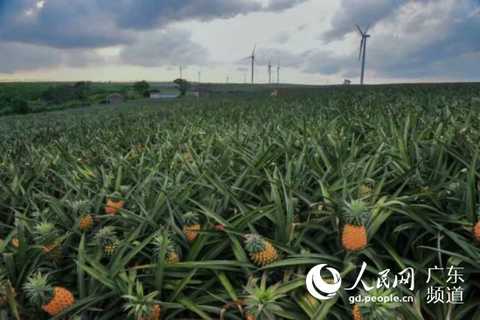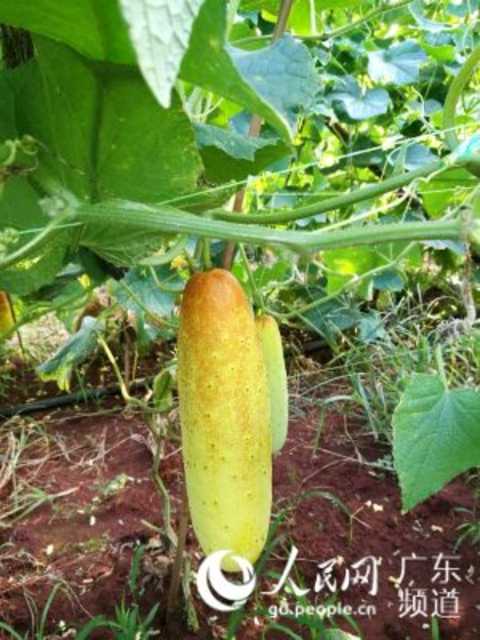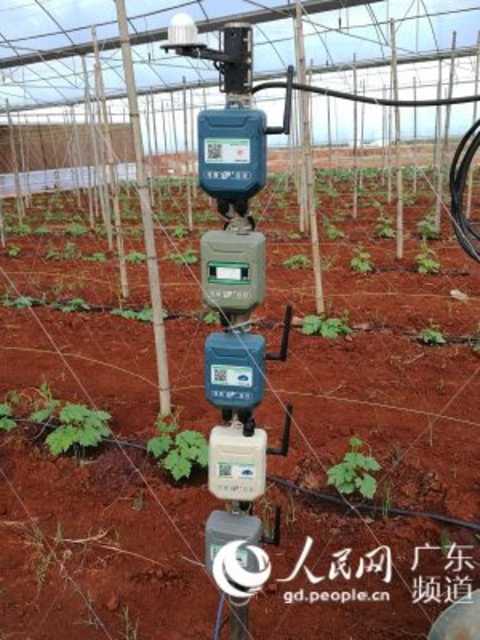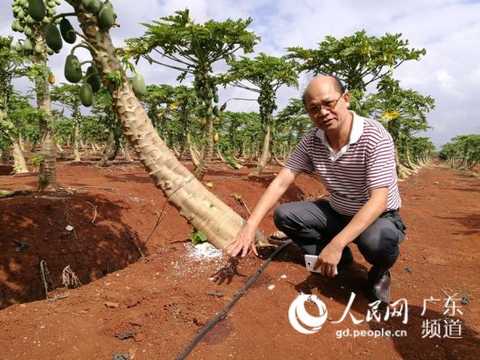Every year when the light snow passes, especially in the northern ice and snow, the peasant brothers in Xuwen County, the southernmost tip of China's mainland, are very busy and excited.
In the fields, there are piles of fresh melons that have just been picked up; National Road, which is filled with extended trucks from all over the country. After waiting for some time, the big trucks are full of green and joy, across the Yangtze River, the Yellow River, all the way to the green, running to Chongqing, Wuhan, Shanghai, Beijing and even Hohhot, Urumqi and other large and medium cities. Short ten hours, more than three or two days, these green oil, watery pepper, cucumber, eggplant, beans, shallots, leeks, sweet corn, etc., will reach the public's table. According to statistics, last year Xu Wendong planted 380,000 mu of fruit, with a total output of more than 900,000 tons, with a total output value of more than 1.6 billion yuan. To Xu Wen, there are as many as 30,000 or 40,000 large trucks carrying fruits and vegetables.
Xuwen County, which used to be a drought for ten years, is now an important northern vegetable base in southern China. It is also the hometown of Chinese pineapple, the hometown of Chinese bananas, the leading vegetable county in China, and the pollution-free fruit and vegetables in China. Qiang County, "China's largest production base in South Pearl", "National Modern Agricultural Demonstration Zone", "the first batch of national marine ecological civilization demonstration zones", "China's longevity town"...
The major change that brought Xu Wen to a great change and changed Xu Wen to a new day came from the 18th year ago when the Guangdong Provincial Party Committee and the Provincial Government made a major decision to “change water and cure droughtâ€.

The pineapple of the four seasons.
At that time, "Fire Slope", now "Golden Silver Nest"
"Xu Wen is located in the Leizhou Peninsula, surrounded by the sea on three sides, the terrain of the turtles, and the rain will soon flow away. Therefore, since the ancient times, the drought has been ten years." Although the typhoon brings rainwater every year, the distribution is uneven, mainly concentrated in From August to October, other months have no rain for a long time. "There are empty fertile red land, which can only barely eat and drink." "As long as there is water, the chopsticks can grow out of the roots. The key is to keep the water." Live "...water! Water!! Water!!! In the interview, the reporter listened to the local cadres and said that the past is a bitter drought and today is not afraid of drought. Because of the lack of water, the soil formed by Xuwen volcanic ash is a thousand miles away. For a long time, only low-value drought-tolerant crops can be planted, and economic and social development is severely restricted, making it difficult for successive politicians to sleep.
Zhu Huasheng, a former secretary of the Xuwen County Party Committee and later appointed as the director of the Zhanjiang Municipal Agriculture Committee, once told people about one thing. One day, it was raining and raining. He went back to Xu Wen’s hometown on a business trip. He couldn’t sleep at night. In the middle of the night, he heard the leaves rustling in the window, thinking that the rain was coming. He was so happy that he quickly got up and walked to the yard. In the hand, I took a pergola and looked up at the night sky. But where is the water? He looked forward to the night until the day was bright, and God still had no rain.
The drought and water shortage in Leizhou Peninsula is like a soldering iron in the hearts of the main leaders of Guangdong Province. At the end of 1998, the Guangdong Provincial Party Committee and the Provincial Government held an on-site office meeting in Zhanjiang in time. Li Changchun, then member of the Political Bureau of the CPC Central Committee and secretary of the provincial party committee, made a “implementation of water reform and drought control in the southwestern part of Leizhou Peninsula and construction of a subtropical agricultural demonstration zone in the south of the Leizhou Peninsulaâ€. The decision and the decision to “expand the wells on the hard channel and improve the ecological structureâ€.
1.98 billion yuan of water and drought management funds were quickly put in place.
Expansion: Focusing on the Dashuiqiao Reservoir, 53 large, medium and small reservoirs have completed the expansion and reinforcement project with high quality. The reservoir capacity of the county has increased from 250 million cubic meters to 370 million cubic meters, an increase of nearly 50%. The amount of water storage; hard canal: rectification of the drainage channel system is 822 km, the anti-seepage channel is 1116 km, and the reinforced seawall is 38 km; the well is drilled: 38,745 eyes are drilled, and 16 water-drawing projects are constructed. The county restored and improved the irrigation area of ​​434,000 mu, the newly added irrigated area was 278,100 mu, the total irrigated area reached 773,000 mu, and the irrigation rate exceeded 70%. Many high terraces and “Wangtiantian†were irrigated, and agricultural production conditions were significantly improved. .
With the “big water tank†and the well-distributed wells all over the county, it is also a decade of drought. Xu Wen’s agricultural production is almost unaffected, basically guaranteeing drought and flood protection, benefiting more than 500,000 farmers in 15 towns (streets). . "The people don't have to look at the face of God to eat," said Yang Shihuang, vice chairman of the county CPPCC and director of the county agricultural bureau. "No, last year Xu Wen suffered a drought, and the provincial meteorological bureau issued a red alert. The provincial leaders rushed to Xu Wen. Discussing the issue of drought relief. At first glance, there are signs of drought in the greenery. Where is the sign of drought? It’s a deepening of the past, and it’s the power of changing water and drought for more than a decade. The hanging heart suddenly puts down.â€
"Go, take you to see the 'fire burning slope' of the year, now the 'golden silver nest'." Lao Yang Xingzhi is getting higher and higher. During the talk, the car turned on a two-lane cement machine, and a large piece of verdant green potato on the left side, a man and a woman were holding an electric deratrator, cutting flowers and removing the vines from the green potato; a large group of black goats on the right were wearing In the afterglow of the setting sun, he screamed and swayed toward the crowd.
Lao Yang Nianzi’s “burning slope†is a famous wasteland. The area of ​​“burning slope†farmland is more than 25,000 mu, involving more than 18,500 farmers. Because of the lack of water, since ancient times, the people can only grow drought-tolerant crops such as sugar cane, cassava, and citronella, but the benefits are very low, the yield per mu is less than 1,000 yuan, and the per capita income is less than 3,500 yuan. Using the water-saving funds supported by the provinces and municipalities, Lao Yang, who served as the head of the township of Chengnan Township, led the group. It is here that more than 1,650 large and small wells were drilled here, so that all farmland was irrigated. Here, it has gradually developed into a “Nanshan Town Modern Agriculture Demonstration Zoneâ€. In 2015, a total of 18,400 mu of anti-season Beiyun vegetable base was built here, mainly planting pepper, leeks, and big leafy vegetables, with a yield of more than 8,000 yuan per mu. The per capita disposable income of farmers is 13,150 yuan, and more than 80% of the villagers have built Xiaoyanglou. Later, they are affectionately called "Chili House", "Banana House" and "Pineapple House"... The famous Bo'ai Village and Jiaoxiang Six natural villages such as the village were also awarded as “Zhanjiang Ecological Civilization Villageâ€, and the Daluoyuan Village and Lingshan Palace Village were rated as “Guangdong Ecological Civilization Villageâ€.
Recently, Wei Hongguang, the new secretary of the Zhanjiang Municipal Party Committee, led a team to Xu Wen to investigate the construction of water conservancy projects, and further proposed to “expand the hard canals to build mountain pondsâ€, mobilize the masses to develop mountain ponds to store water, and rebuild the forests by returning farmland, returning ponds and returning forests. The water source has fundamentally changed the drought situation in Leizhou Peninsula.

A gratifying cucumber.
"National Modern Agricultural Demonstration Zone" is beginning to show
Water is the source of life, and Xu Wen, who suffers from drought, knows the preciousness of water.
In Xu Wen, the reporter saw that almost all the agricultural land was covered with thick or thin water pipes. Such large-area and densely arranged water pipes for irrigation and cultivation are extremely rare in other agricultural production areas in China. Xu Shaolan, a member of the Standing Committee of Xuwen County and the Minister of Propaganda, who has just stepped down as the deputy head of agriculture, said that through irrigation or drip irrigation, Xuwen’s agricultural water conservation rate is generally over 60%, and some even reach 95%, and the integration of water and fertilizer is realized. Precision watering and precise fertilization.
In the fruit and vegetable planting base of Fumin Company, 2,000 acres of contiguous papaya grows gratifying and the fruit is good. Xing Boss, who is far away from Nanning, heard that reporters and his party arrived and immediately launched the “Cloud Platform Intelligent Agriculture Monitoring System†with a mobile phone, demonstrating the remote drip irrigation and drip irrigation planting method. In less than a minute, the black rubber pipes laid along the papaya tree ooze out of the water, and the soil around the trees was quickly wetted. It turned out that this is the new water-saving technology and intelligent agriculture concept that his children brought back to Israel a few years ago. In a word, it used to be pouring water, and now it is pouring crops.

Light temperature sensing irrigation.
In order to save water, Xuwen County's farmland widely uses water-saving technologies such as sprinkler irrigation, drip irrigation, micro-irrigation and infiltration irrigation. The water-saving irrigation area has been developed from the original 200 mu to the current 400,000 mu, including 280,000 drip irrigation and water and fertilizer integration. It covers an area of ​​70,000 mu of irrigated land and covers an area of ​​50,000 mu.
The improvement of production tools is also changing with each passing day. In a plantation in the village of Jinhe Town, Jinhe Town, two workers pushed a drilling wheel and ran over the film-covered soil. The “tooth†of the drilling wheel left two rows of uniform on the film. Small holes with a spacing of about 30 cm. According to the operator, they have to plant more than 30 acres of green peppers this time. 30 workers drilled holes with drill holes, and they can be planted in one day. If it is in the past, it will take at least 50 hours, and the labor cost will save tens of thousands of yuan.
Using information technology to grow vegetables is also an eye-opener. Entering Zhengmao's smart greenhouse, it has entered a giant production workshop. Many of the bitter gourd planted inside, many have opened golden yellow flowers. Several little bees stopped when they were flying, and they pollinated hard. Investor Li Jinquan explained that Dading bitter gourd has a high selling price and high temperature requirements. He specially equipped a set of “water and fertilizer integrated intelligent irrigation control systemâ€, which can sense the illuminance, carbon dioxide, air temperature and humidity, soil temperature, etc. in the greenhouse in real time, and realize automatic irrigation, temperature adjustment and fill light through data. Shading, fertilizing, etc. In the greenhouse, in addition to a temperature-controlled curtain wall, a number of electric fans are installed, and the light is a sensor, four sets are installed, and the drought is still stable and high-yield.
Xu Wen’s crops are poured with “mineral water†(groundwater), with plenty of sunshine and a variety of modern technologies to serve, naturally rich in gold and high in quality. But if you grow well, you have to sell well. In Qujie Town, the reporter saw the "Pineapple Sister" - Wu Jianlian, President of Xuwen County Pineapple Association. In 2007, when Wu Jianlian was doing business in Linyi, Shandong Province, he found that a town had set up dozens of peasant economic cooperatives to bring stable economic benefits to the masses and was greatly inspired. At the end of the second year, she also returned to her hometown Longmen Village to set up a farmer's professional cooperative called “Lianxiangâ€. Farmers “use money to buy shares when they have money, and use land to buy shares without moneyâ€; unified planting, unified procurement, production and marketing docking, Quality assurance. Today, the number of cooperative members has grown to 186, with an annual sales of 10,000 tons of pineapples and a large wholesale market.
In order to encourage young people to use the Internet to help sales of quality agricultural products, the county government has also invested heavily in building an e-commerce youth entrepreneurship park. In the past year, a number of well-known e-commerce companies such as Tmall have been stationed. Together with farmers' cooperatives, they sell agricultural products such as pineapple, prawns, and horse-fish dried fish, and sell more than one million pieces of products with a turnover of more than 27 million yuan.
In order to improve the efficiency of modern agriculture and increase the income of farmers, it is necessary to speed up the adjustment of agricultural structure, vigorously develop high-efficiency characteristic agriculture, optimize the industrial layout, and achieve "people without me, people with me, people with specialties." "Which variety cycle is short, what variety of high yield, what products are the most profitable, we will plant!" County Mayor Wu Kangxiu laughed.
At present, Xuwen County has basically formed pineapples and prawn in the eastern towns and towns. The western towns and towns mainly use woody fruits, pearls, sea cucumbers and cages. The southern towns and towns mainly feed vegetables and black goats, and the northern towns and towns are north. The vegetables, sugar cane and sericulture are the main products, and the intensive production pattern of vegetables, sweet corn, bananas and good ginger is mainly distributed in the middle towns and towns. At the same time, the establishment of 260,000 acres of pineapple, 170,000 acres of bananas, 430,000 acres of vegetables, 200,000 acres of sweet corn, 100,000 acres of sugar cane, 40,000 acres of good ginger, 30,000 acres of early lychee, 20,000 acres of sericulture, 20,000 acres Papaya, 50,000 mu of shrimp, 160,000 cubic meters of water shrimp hatching, 5,000 acres of pearls and 60,000 goats and other 13 agricultural commodity bases. A group of leading industries with the characteristics of South Asia and the tropics and strong competitiveness are thriving. Yugonglou pineapple, Xuwen goat and Xuwenliang ginger have been included in the national geographical indication protection products; “Yugonglou†brand pineapple and “Warrior†brand green tea have successively obtained national green food certification. Xu Wen’s “National Modern Agricultural Demonstration Zone†was first revealed.

Drip irrigation.
From ten years and nine droughts to "ecological Xu Wen" and "hometown of longevity"
At the southernmost tip of the mainland, there is almost no wasteland. Xu Wen’s red land is not idle all year round, and 365 days are green-based. Here, the sky is blue and clean, the forest is lush, and the air is fresh. Under the traction of Xuwen Modern Agriculture, as an upgrade and extension of modern agriculture, “Ecological Xu Wen†and “Hometown of Longevity†are increasingly prominent.
Xuwen is located on the north bank of the Qiongzhou Strait, away from the central city. Good ecology is its precious resource and development space. At the beginning of the year, as the "engine" of "Ecological Xuwen", the Xuwen Eco-industrial Cluster, a provincial-level industrial cluster, was born. The park covers an area of ​​5,750 mu, including five supporting areas: comprehensive supporting service area, ecological green land landscape area, food and medicine processing area, advanced manufacturing industrial area and modern logistics area. The region is dominated by ecological industries such as biomedicine, electronic technology, and low-carbon environmental protection projects. At present, Zhanjiang Pineapple Family Industrial Co., Ltd. has settled down, with a project investment of 38 million yuan, mainly processing pineapple and various fruits and vegetables, with an annual production capacity of 20,000 tons. Guangdong Fengselang Liangjiang Co., Ltd. is expected to produce 5,000 tons of dried ginger per year. 1 ton, 10 tons of ginger tea; Zhanjiang Green Energy Thermal Power Co., Ltd. mainly produces and sells biomass boilers and biomass molding equipment.
Xuwen County also uses abundant wind resources and tidal resources to build a large wind power base and clean energy base in the province. At present, China Huadian, China Power Investment, Yudean, and Yueneng have successively entered the beach. There are 18 900,000 kilowatts of onshore wind power projects and 500,000 kilowatts of offshore wind power projects, with an intentional investment of nearly 10 billion yuan.
In terms of eco-tourism, the "Implementation Opinions of the Guangdong Provincial People's Government on Promoting Tourism Reform and Development" issued this year clearly stated that it will speed up the construction of rural tourism including Zhanjiang's tropical-south subtropical leisure agricultural tourism. As an ecological agriculture county, Xuwen has established many ecological demonstration bases such as Longtang Banana, Qujie Pineapple, Maichen Vegetable, Longtang Liangjiang, He'an Prawn, Xilian Pearl, Nanshan Leek, and Horntail Red Onion. The Xuwen Coral Reef Nature Reserve, located in the coastal area of ​​Jiaowei Township and Xilian Town, covers an area of ​​about 109 square kilometers. It is also recognized as a coral reef resource with large area, concentrated species and well-preserved resources. In 2014, Xuwen County passed the examination and acceptance and became the first ecological civilization city in the city. Subsequently, Hai'an and Nanshan were rated as “National Ecological Townsâ€, Qusang was rated as “Guangdong Province Ecological Demonstration Townâ€, 7 towns and towns such as Hai'an and Xiaqiao were rated as urban ecological civilization towns, and 460 villages such as Longmen were evaluated. It is a city ecological ecological village.
On April 28 this year, the “First Pineapple Culture Tourism Festival†was held in Qujie Town. On the same day, the wind and the sun, the guests gathered, as if in a European town. At the foot of the boiling crowd, 130,000 mu of contiguous pineapple, like a colorful Huajin, stretches over the hills, and at first glance, it forms a magnificent "pine of pineapples", with scattered villages, white wind turbines, Together they form a fascinating picture of the South Asian tropical ecological agriculture. The “Pineapple Sea†has also been named one of “Five Top Tourism Experiences in Guangdong Province†by the world-famous Lonely Planet magazine.
Red soil, green land, blue sky and white clouds are the beauty of Xu Wenyuan's ecology; sweet water, fresh air, golden selenium-rich fruits, and a wide variety of seafood are the flavors of Xu Wenyuan's ecology. Together they gave birth to the health of Xu Wenren. Good mountains and good waters longevity. According to the data, there are 112 centenarians in Xuwen County, accounting for 15.3/100,000 of the total population, exceeding the standard of “China's longevity townshipâ€; the elderly over 80 years old in the county account for 21.3% of the elderly population over 60 years old. The standard for “China’s Longevity Township†is 7.3% higher; the average life expectancy is 77.75 years, and it is 0.95 years older than the national average. In December last year, after the on-the-spot inspection and assessment, the Chinese Society of Gerontology officially awarded Xu Wen County the title of “China's Longevity Townshipâ€. Relying on the two unique advantages of “ecology†and “longevityâ€, Xuwen is building a number of health and leisure tourism villages and eco-agricultural sightseeing experience parks, and “South China Winter Holiday Destinations†stand out.
Responding to the construction of Hainan International Tourism Island and the construction of the central city of Beibu Gulf by Zhanjiang, the Xuwen County Party and County Government also proposed to build the “Strait of China's Antarctic Village†and accelerate the “South End Resort†and “Yi Shui Yuntian Resortâ€. "The two projects will be completed, and the construction of the beautiful village area of ​​Xujiatun Village and Xiap Village of Jiaowei Township will be fully launched. We will fully promote the construction of tourism projects such as the pineapple sea, the Longmen World Eco-Agricultural Tourism Zone, and the Baishawan Tourism Holiday, accelerate the construction of the Wugang New Rural Area in Hai'an Town, and push for the construction of the Sunshine Coast Project in the first half of the year. Take advantage of the Han Dynasty Maritime Silk Road to discover the historical sites of the port and the selection of the "Guangdong Ten Sea Silk Road Cultural Geographical Coordinates" to actively build the Dahan Sandun tourist attraction.
Xu Wenxian, secretary of the Xuwen County Party Committee, said that by promoting the integration and development of modern agriculture and eco-tourism, consolidating the “ecological Xu Wen†and “hometown of longevity†and polishing the business cards of “Ecological Xu Wen†and “Hometown of Longevityâ€, Xu Wen will surely step out of a high The beginning of the rise of the "ecological tourism" road.
From the long-term drought-stricken areas to the modern agricultural towns and eco-tourism districts, an article on how to improve water and drought has made Xu Wen exchange for a new day.
Damei Xuwen, it is: it is too cold to the north, too hot to the south, Xu Wen is just right. (Reporter Jiang Baozhang Luo Aihua)
Fuzzy Blankets,Plush Blankets,Plush Throw Blanket,Microfleece Blanket
Ningbo Kareer Import and Export Co.,Ltd , https://www.kareertextile.com